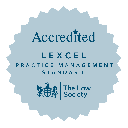- Home >
- Brain Injury Claims
Our brains control our mobility, thoughts, emotions and so much more. Any damage to the brain can have life-changing consequences, from altering a person’s personality to restricting their development.
If you or someone you love has lost brain function due to inadequate care, we will fight for your right to justice. With over 30 years of dedicated experience, our specialist brain injury solicitors are the experts you can rely on to find answers and claim the compensation you need to maximise your quality of life.

Do you have a brain injury negligence claim?
Damage to brain tissue can profoundly impact someone’s mental capacity, mobility and capabilities. When a healthcare professional’s negligence causes these injuries, they must be held accountable and those affected must be compensated.
If you believe you or a family member suffered a brain injury in the course of their care, our solicitors are here to prove your case. Whether it was an avoidable injury during your child’s birth or a surgical error, our extensive experience helps you achieve the best possible outcome.

The specialist brain injury claims solicitors for Essex & East Anglia
Since 1993, our trusted medical negligence solicitors have recovered millions in compensation for clients affected by life-altering brain injuries.
Approaching each brain injury claim with unrivalled attention to detail and compassion, we build a watertight case that secures the financial support you need for ongoing care and rehabilitation. Working on a strict ‘no win, no fee’ basis, we leave no stone unturned to resolve 96% of claims out of court, giving you the justice and peace of mind to move on.
How much could your brain injury negligence claim be worth?
What does our brain injury negligence claim process look like?

A free initial consultation
Call us, request a callback or complete our online form and we’ll assess if you have a valid medical negligence claim.

Funding your claim
Discover the ways we can fund your claim without you paying a penny at any stage of the process.

Investigating evidence
We gather medical records, witness statements and more to learn what happened to you and prove your claim.

Instructing independent medical experts
We work with impartial, experienced medical experts to establish whether your injuries were due to substandard medical care.

Valuing your claim
We assess your health and financial losses to accurately estimate how much compensation your claim is worth.

Presenting your case
We contact the Defendants and the Courts on your behalf to set out your allegations and receive a response.

Negotiating a settlement
We work to achieve a fair settlement for you outside the courtroom – this is how 96% of our cases end.

Preparing for Trial
If we must proceed to Trial, we fully prepare you for what to expect so you receive the right result in court.
FAQs about brain injury negligence claims
What is brain injury negligence?
Brain injury negligence happens when medical treatment falls below an acceptable standard and causes an injury to part of the brain.
Sometimes referred to as medical malpractice brain injuries, these situations can occur as a result of surgical errors, misdiagnosis, delayed treatment, inadequate monitoring and other examples of substandard healthcare.
Examples can include Birth injury claims, including oxygen starvation claims, as well as brain injuries caused by surgical negligence.
Can I contact a personal injury solicitor to handle my brain injury case?
If you or your loved one’s brain injury was caused by a medical professional or in a healthcare setting, we would advise you to contact a specialist medical negligence solicitor.
These cases can often be incredibly complex and extensive, requiring a deep understanding of clinical negligence law and specific experience in medical negligence cases. Most personal injury solicitors have neither the experience nor the specialist knowledge to help you pursue the maximum compensation you could recover.
However, if your brain injury was caused by a blow to the head, an accident at work, a road traffic accident or similar circumstances, then you should contact a personal injury expert.
View our National and Essex Medical Negligence Statistics post for more industry insight.

What are the different types of brain injury?
There are two main classifications of brain injuries:
- Traumatic brain injury (TBI): This is when the brain injury is caused by a blow to the head or another external force, causing the brain to move inside the skull
- Acquired brain injury (ABI): This is when pressure is exerted on the brain on a cellular level, potentially due to a brain tumour, neurological illness, lack of oxygen or similar condition
Under these definitions, most brain injuries that are caused by medical negligence fall within the acquired brain injury category, while traumatic brain injuries will typically fall under personal injury.
What common mistakes can lead to brain damage claims in the UK?
Notable examples of medical negligence that may result in a brain injury include:
- Failure to identify a lack of oxygen before, during or shortly after birth, causing a significant birth injury such as Cerebral Palsy
- Negligent brain surgery causing damage to nerves or blood vessels
- Failure to gain informed consent before brain surgery
- Excessive use of anaesthesia during surgery
- Misdiagnosis of brain tumours, blood clots and other neurological conditions
- Misdiagnosis or delayed treatment of meningitis and similar infectious diseases
- Misdiagnosis or delayed treatment of a stroke
- Failure to prescribe the correct medication for a brain condition
At Gadsby Wicks, we have a strong track record of success supporting brain injury claims across these varied circumstances, meaning we can provide the necessary expertise to guide your case to a favourable resolution.
Can a brain injury be sustained before or during childbirth?
Yes, brain injuries can be sustained before or during childbirth, typically due to a lack of oxygen (anoxia) affecting the baby’s development.
Furthermore, because our brains continue to develop until we turn approximately 25, any injury sustained as a baby, child or young adult can have a more dramatic impact on a person’s long-term development than one experienced later in adulthood.
How do I know if I have a claim for my brain injuries?
To establish if you have a legitimate brain injury negligence claim, we must answer three key questions:
- Did a healthcare professional breach their duty of care to you during your treatment?
- Did you suffer a significant brain injury during your treatment?
- Was the healthcare professional’s breach of duty directly responsible for your brain injury?
For your claim to be valid, it must meet all three of these criteria. If one area falls, your claim will not be successful. That is why it’s so important to work with a true medical negligence specialist who understands these requirements and what steps must be taken to establish your claim.
As part of our comprehensive medical negligence claims process, we will:
- Set you up with your dedicated solicitor to discuss your situation
- Gather all relevant evidence to reinforce your claim
- Consult with independent medical experts
- Contact the Defendant, assess their response and advise on your next steps
- Negotiate with the Defendant to reach a fair settlement
- Prepare you for your court hearing should your case proceed to trial
If we conclude that your claim does not meet the necessary criteria, we will inform you at the earliest opportunity with an explanation as to why we will not pursue your claim further.
To find out if you have a potential brain injury negligence claim, you can answer a few short questions on our dedicated “Do I have a claim?” form.
Contact our expert brain injury negligence claims solicitors
If you or a loved one suffered a severe brain injury during medical treatment, speak to someone about your options. Our team is here to listen and advise you on your next steps.

Lexcel accredited medical negligence claims solicitors
We are proud to be a Lexcel-accredited practice. The accreditation is a mark of quality and comes directly from the Law Society.
A recent assessment described us as a “Centre of Excellence” and we continue to operate to the highest standards across all main areas of our field. These include client care, case management, financial management, structure and strategy, people management, risk management, information management and file management.










